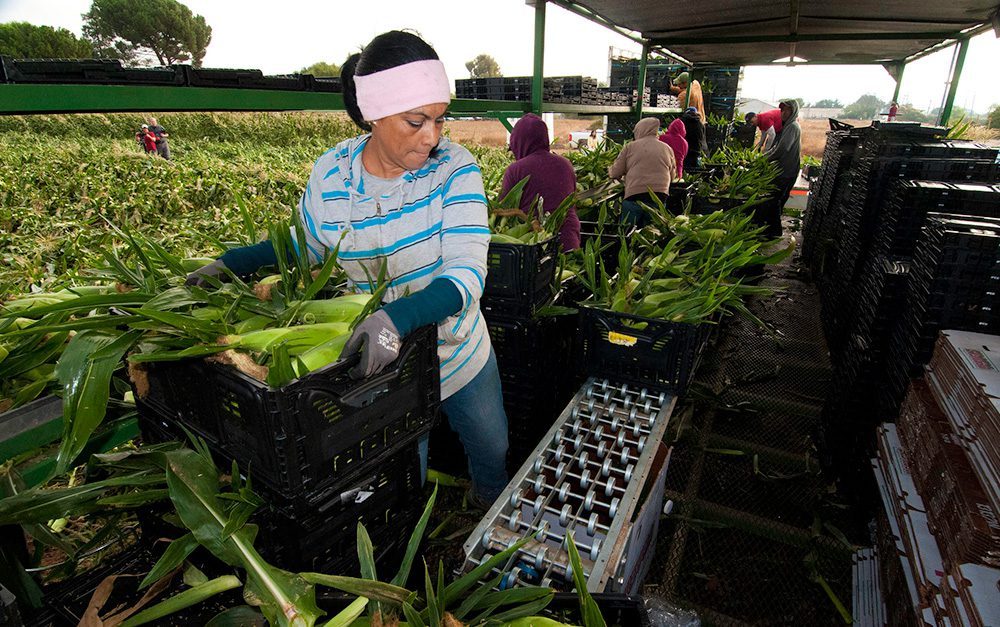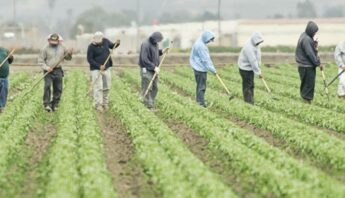Decades after Edward R. Murrow’s Harvest of Shame documentary and John Steinbeck’s The Grapes of Wrath, farmworkers in this country still face many of the same deplorable conditions.
Pesticide exposures come on top of other widespread workplace problems, including intimidation, harassment and even wage theft. Farmworkers and their families often survive in extreme poverty punctuated by substandard housing and lack of access to clean water, adequate food, healthcare and education.
PAN works with farmworker advocates across the country to address these issues — all direct byproducts of industrialized agriculture.
Laws don’t protect farmworkers
Farmworkers are regularly exposed to pesticides in many ways.
They can breathe in or absorb harmful chemicals through their skin while they mix or apply pesticides, or during planting, weeding, thinning, irrigating, pruning, harvesting and processing crops.
Many incidents go unreported, but California data on farmworker poisonings highlight the extent of the immediate problem. Studies have also documented elevated risks of chronic diseases linked to pesticides, including cancer, birth defects and learning disabilities.
I don’t know the risks because I never received a training. I was applying pesticides and I felt many symptoms. I learned that the chemicals are very bad for our health.
— Mario, excerpted from 2014 Farmworker Association of Florida survey
Farmworkers and their families can also be exposed when living in or near treated fields. And studies show that pesticides carried from field to home on parents’ clothing and skin put farmworker children at risk.
Our regulatory system has failed to protect farmworkers from these on-the-job harms. Farmworkers are some of the only workers in the country not provided protections under the federal health and safety agency, OSHA. Our Fair Harvest campaign tackles this injustice head on.
Heated politics of farm labor
Political rhetoric often swirls around the issue of immigration. Meanwhile, little is done to address the on-the-job dangers faced daily by families who cross the border to harvest fruits and vegetables like strawberries, apples or broccoli.
Undocumented workers are less likely to seek medical care when exposed to pesticides, and rarely report poisonings. Under the current system, hundreds of workers — including children — suffer from pesticide-related illnesses every year.
Thoughtful reform of U.S. immigration policies would be a major step toward acknowledging and addressing the shameful working conditions faced by thousands of migrant farmworkers every year.
Safe & healthy fields
A healthy, safe and fair food system would serve the common economic needs of farmworkers, farmers, rural communities and consumers. Shifting away from reliance on hazardous pesticides — and toward agroecological farming — is a key step toward this goal.
Also essential is bringing decision-making power back to the farm. Currently, corporate giants control everything from seeds and chemical farm inputs to the purchase, processing and marketing of farm products.
Gradually, this needed shift is gaining momentum — from the ground up. “Local food economies” are growing, farmers are demanding more control of inputs and production on their own farms, and farmworkers are beginning to experience (and support) the safer and healthier working conditions resulting from sustainable farming.
PAN works closely with farmworker advocates across the country to strengthen federal rules protecting workers in the field. We also work with partners to move market forces and improve working conditions through the “Equitable Food Initiative” (EFI). A certification and labeling program, EFI was developed by farmworkers, farmers, retailers and consumer advocates to ensure safe, healthy conditions in the fields and quality produce in the markets.
Photo: USDA | Flickr







